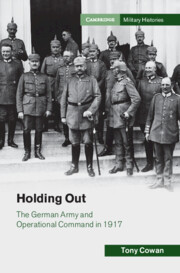‘Even the well-informed reader will learn much about how the German army functioned from Holding Out. The book's conclusions go far beyond 1917 and are important to sharpen our understanding of the German army during the entire war. Cowan fights against the idea of the German army being the ‘benchmark’ of military quality and offers a much more nuanced picture of a military organism with great strengths and great weaknesses.’
Holger Afflerbach - author of On a Knife Edge
‘Tony Cowan’s fascinating case study of the battles of early 1917 is a work of meticulous scholarship and deep insight which sets a new standard for our understanding of war on the Western Front, and of the strengths and weaknesses of the German army in the first half of the twentieth century.’
Jonathan Boff - author of Haig’s Enemy
‘Holding Out demonstrates the power and resilience of the German war machine by treating it as an organisation run by real, often flawed, people working in situations of great stress and with finite resources. For that reason it offers a far more convincing appraisal of the German army in the First World War than the work of its many apologists.’
Paul Skrebels
Source: Sabretache
‘There is no doubt that the German army in the Great War was highly professional and able to learn and adapt, that is why it was able to hold out for so long in the face of increasingly unfavourable odds. This dense, detailed and fascinating tour de force tells us how it was done.’
John Spencer
Source: The Western Front Association
'… detailed and fascinating …'
John Spencer
Source: The Western Front Association
‘This book exudes Cowan’s determination to bring the German army down a peg, because of the mythologically impressive character to which it has often been ascribed … The reader can gain from this book further information to consider in understanding the character, practices, and execution of an army that was by no means perfect but that inarguably resisted the combined efforts of powerful enemies on multiple fighting fronts for several years.’
Nicholas Sambaluk
Source: H-Net Reviews



